The Windows RT Review
by Vivek Gowri & Anand Lal Shimpi on October 25, 2012 12:00 PM EST- Posted in
- Windows RT
- Operating Systems
- Microsoft
- Mobile
- Windows 8
- Tablets
First Party Applications
Microsoft has bundled in a healthy suite of first party applications for Modern UI, including obvious suspects like Internet Explorer, Mail, Calendar, People, Maps, Messaging, and Bing, as well as apps for things like news, finance, sports, weather, remote desktop, and media playback, amongst others.
There’s also a list of desktop applications that’s a little less heartening. The familiar old Windows Accessories are still sticking around, with favorites like Paint and Notepad joined here by the classic Remote Desktop Connection application, Snipping Tool (another holdover from the Windows Tablet PC days), the Math Input Panel, and XPS document viewer. Ease of access applications, too, are desktop-based, as are system functions like Control Panel, Command Prompt, File Explorer, Task Manager, and the Run dialog. Personally, I’m disappointed that there wasn’t a Modern UI version of Command Prompt because, let’s face it, how cool would that be?
You’ll note that I left out the headlining Windows RT application: Office 2013. It’s one of the most vital pieces to the Windows RT puzzle, so it demands a bit more context - I’ll get to it in a bit, after running through some of the more notable first party applications.
The mail application here is decent, with an ultra-spartan design and a straightforward 3-column layout. You get accounts and folders on the far right, a middle column with the sender, subject, and thread information. When you expand a multi-email thread, a message preview is also shown. Finally, in the main part of the window, the selected message is displayed. If you’ve used any recent version of Outlook or Hotmail, the layout and implementation should be instantly familiar except for the Metro visual style. Compose, reply, and delete are located in the top right corner of the email window, while mark as unread and move to folder are located in the bottom edge swipe bar.
As far as options go, there really isn't much to mess with - just the ability to turn off threaded messaging. You can connect any EAS, IMAP, or POP email accounts, with support for Hotmail, Gmail, Exchange, AOL, and Yahoo mail accounts built in already. For Gmail accounts, the delete button actually just archives things - to really delete mails, you need to move the message to the deleted folder.
Mail isn't Outlook, and usability is far from perfect. Manual syncing requires an edge gesture to reveal the sync button and there's no way to just tap on a sender's name and create a new email. There are other little issues like these that keep Mail from being a best in class tablet email client. Mail works, it just isn't great.
Calendar
The calendar application is similarly focused - a very clean user interface with not too much power, but it does exactly what it needs to. It will sync to Hotmail, Google, and Outlook calendars, and I'm hoping that once there is a Facebook application, it will sync to that as well. You can pick between day, week, and monthly resolution from the bottom swipe menu, which is also where you add new calendar events. Options for adding new calendar events include date, time, length, location, repetition and reminders - the standard list. The UI is again very touch-centric, so trying to use the calendar with just the mouse is slightly frustrating since everything is hidden in the edge swipe bar. Thankfully, pressing or clicking on a particular day/time takes you directly to a new event creation page, which is pretty convenient. I like the way the calendar application operates, and the visual style is perfect for getting the information you need at a glance. Power users might find it lacking, but for basic tasks, it's more than adequate.
Messaging
The messaging application is one that has so much potential, but needs more to really be useful unless you only use Live Messenger and Facebook Chat. Personally, given the Skype acquisition and the combining of the Windows and Skype IDs (I’ll get to this later, but basically when you login to Skype, your Windows ID is linked to your Skype ID), I feel like the Messaging app should either include Skype chat in it or somehow fuse Skype with the messaging protocols already in place. I personally rely on Google Talk, and in an ideal world it would be supported as well, but I won’t hold my breath.
Nobody I know has used Live Messenger since it stopped being MSN Messenger, so I reserved most of my testing for Facebook Chat. It’s a good looking chat interface, but using it full-screen is a total waste of display real-estate. Messenger is an application that lives for Windows 8 Snap, and it’s really the perfect app to show off that capability with. Finally, a tablet operating system that’s good for instant messaging.
Bing News, Sports, and Travel
There are a variety of Bing-based applications here - News, Sports, Travel, and of course, Bing itself. I personally don’t find too much point to the Bing search app, since if I’m already in the browser it’s much easier just to search from the URL bar.
The other applications are somewhat interesting though. Sports and News are very similarly designed, so I’ll cover them together. Basically, there’s a top story that takes up most of the front page. You can horizontally scroll through a number of other headlines, aggregated from various news sources (Reuters, NYT, AP, etc) and separated by category - US, World, Technology, Business, etc. You can choose to browse the “Bing Daily” news, news specially targeted towards you, or pick from the list of sources to see each one individually. (My feed was full of technology news, wonder why.) Sports is essentially the same thing, except with the categories being sorted into the various sports. You can pick favorite teams, look at all the day’s sporting news or just the particular sport you want to see.
In either case, the articles are presented in a clean, easy to read format. For a one-stop-shop news source, it’s pretty decent. The overall treatment reminds me a bit of Flipboard a bit, while the articles themselves are displayed in a reading optimized context like Apple’s Reader mode in Safari. The treatment is obviously different - horizontal columns and page scrolling, but it’s a generally similar concept.
Bing Travel is a bit different - it has a list of popular destinations, and features numerous photos, maps, panoramas, list of attractions, hotels, restaurants, and guides for each city page. From the app, you can research the location, book flights and hotels, and use the application to guide your trip plan in terms of sites and restaurants to visit. Most big cities in each geographic region are listed, though smaller travel destinations are a bit harder to come by. I can see the app being really useful when on travel as a more convenient alternative to Yelp.


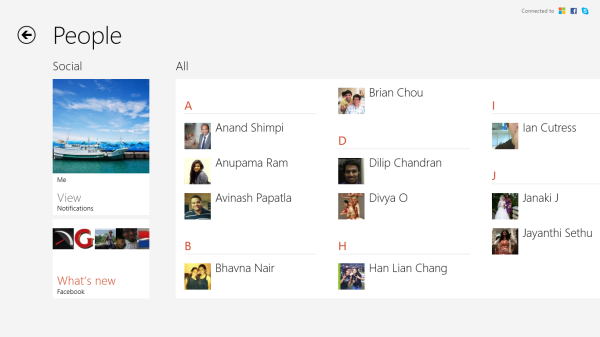
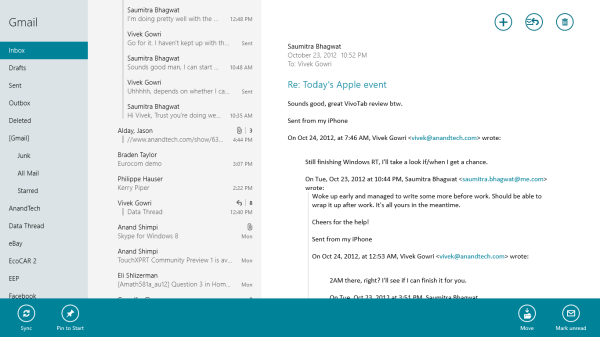
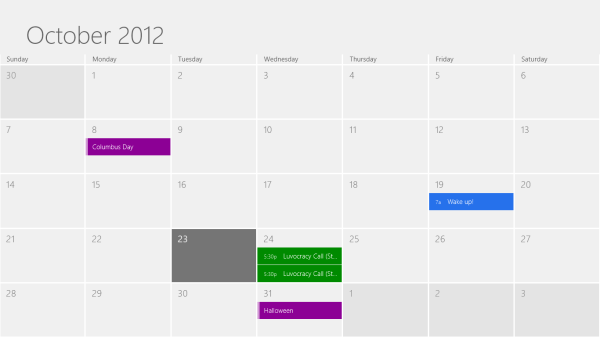
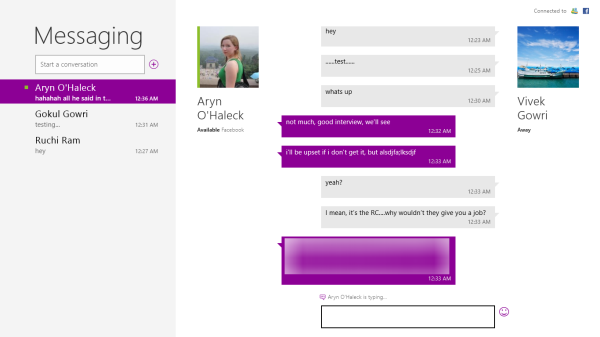
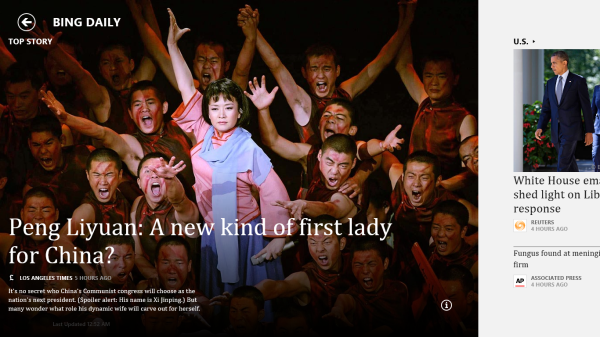
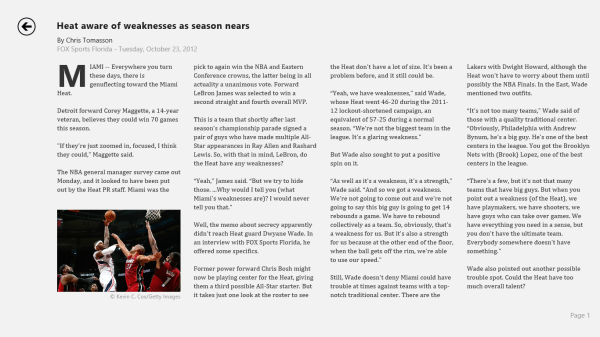
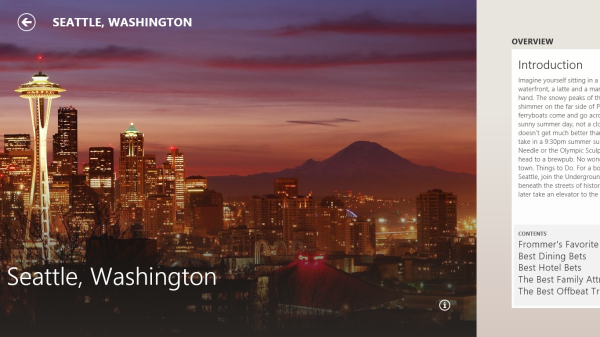








233 Comments
View All Comments
steven75 - Friday, November 2, 2012 - link
It's not just the number where Windows Phones is lacking, but the quality and functionality. Where are the Garageband clones for WP? Where is the full touch-based office suite you get with iWork?HardwareDufus - Thursday, October 25, 2012 - link
Huge Failure. Sorry.I go to the Windows Store.. I see the Surface RT Advertisement.
In 2 seconds I should be able to determine from that page what Applications are available for the Surface RT, before I agree to Pre-Order one for $699 (64GB version). I should be just that easy...it should be more consumer oriented. But it's not.
Huge Failure. Sorry.
So, I click software... I click finance... Is there anyway to quickly determine which one of these is available for Windows8RT? Quicken, Quickbooks, Sage? No... there isn't. So, I have to waste allot of time....
Who's going to pay $699 for a device when they can't easily check which applications are available. This is a huge failure and AnandTech has really glossed over it.... Disappointed in you guys!
faizoff - Thursday, October 25, 2012 - link
Well all you have to do is click on any app and then select the details section. Each app has 3 sections, the details app tells you where it runs on.Ta da.
HardwareDufus - Thursday, October 25, 2012 - link
yeah...let me click on this one...select details... whoops not for RT..
ta da..
let me click on this one.. select details.... whoops snot for RT...
tada...
let me click on this other one... select details... whoops not for RT...
tada...
Your right.. this is so easy... I love this hunt and peck method of finding apps for Windows RT... this is the most amazing applications store I've ever seen... and I'm so glad that I don't have anyother means of purchasing apps for RT..
HardwareDufus - Thursday, October 25, 2012 - link
I don't want 10's of apps.. I want basic browsing, messaging (that means FB, Twtr, etc..), accounting, productivity (had by office...awesome!), maps (google, street, ). I want like 8 apps. BUt I can't easily and quickly determine if they are available.Now, I wouldn't care if the apps could be purchased other places... but it's a closed eco system and I have to buy them from the Microsoft Store... SO it should be easier to see what's available.... for Surface with Win8RT... And it's not easy!
andrewaggb - Thursday, October 25, 2012 - link
Yeah, the windows 8 store needs work. As Anand said, it's hard to find the good stuff unless you specifically search for it. Also the updates section doesn't tell you anything about the update before installing it (not that I could tell anyways). And I didn't see any way to keep you're apps up to date automatically, or roll back to previous versions if you had a problem etc.The store is usable, but probably the weakest of the built in apps.
Another thing about the store that bugs me is that when you look through a list of apps it doesn't indicate which ones you have installed already or provide a way to filter out ones you've already got. Why would I want to see the ones I've already got?
ratte - Thursday, October 25, 2012 - link
Maybe I missed this in the review but isn't Office on RT "not for commercial, nonprofit, or revenue-generating activities".I of course assume that Anand has paid for a commercial licence before he wrote the Surface piece ;-).
glynor - Thursday, October 25, 2012 - link
In the review, you basically dismiss the serious problem they have with app selection by saying "it'll come soon", and point to all the millions of Windows 8 PCs their going to sell over the next year or so as the reason.I understand that, but I'm still VERY skeptical.
The problem isn't that they're going to sell Windows 8 PCs. The problem is this:
If you are an existing Windows developer, what is going to motivate you to completely throw away your existing products and start over again to develop against the WinRT APIs in order to release a Modern UI style application that will run on Windows 8/RT and be sold through the app store?
* You're still going to have to continue to sell and develop your existing applications, for everyone who DOESN'T upgrade to Windows 8. It isn't like those shiny new Modern UI apps are going to run on my Windows 7 PC at home, no anyone else's.
* All of the Windows 8 systems sold will still run your desktop application fine, so then you get the benefit of the massive pre-existing installed base of Windows users.
* The ONLY people "left out" if you don't develop a WinRT-based Modern UI application will be owners of Windows RT devices.
So... If you're Adobe, or any other big development house, what do you do?
You wait and see. Re-writing Photoshop or AutoCAD, if it is even possible in the Modern UI, is no small challenge. Expecting these companies to drop everything and start over from scratch, and do it quickly, seems... Naive.
I expect we'll see a lot of developers of existing cross-platform apps (iOS and Android developers) adopt Modern UI. Everything else? I wouldn't expect an RT-friendly version of Photoshop, Lightroom, or Quicken anytime soon, if ever. It'll all depend on sales of Windows RT devices.
haukionkannel - Thursday, October 25, 2012 - link
Well the trend has been that mobile devices like smart phones and pad has become much, much more important. It is not hard to see that they will be more important and that there will be much more mobile devices than normal desktops in the future...What Joe average do with their computers? They read mail, they read some web pages and show and watch pictures from their children chindrens... What is the best device for that... Mobile computer. It is pity, but hard working picture editors, writers and gamers are tiny minority.
Summasummarum, there will be a lot of Modern UI aplications, much more that there will be normal desktop applications.
glynor - Thursday, October 25, 2012 - link
Generally, I agree.However, the argument seems to be:
There will be plenty of Windows RT capable apps soon because Microsoft is going to sell a bunch of Windows 8 desktop PCs, so there will be a huge built-in ecosystem. And look at all these existing Windows developers we already have.
My answer is:
Maybe.
But all those Windows 8 desktop PCs will not run the Modern UI style apps optimally, and they will also run "normal" Windows applications. You can't port desktop apps to WinRT (the API), and they won't work on Windows RT devices. And, a huge portion of those new Windows 8 boxes are going to go to businesses (like mine) where they're immediately going to be re-imaged to Windows 7.
If you are a current Windows developer, what is your motivation to do all the work to "start over" with a brand new product, if most of your CURRENT customers can't use it at all (they're on XP or Windows 7), or won't use them much because they're on traditional desktops and laptops?
The path of least resistance is to just keep developing your traditional Windows desktop application and wait and see what happens.
Is Microsoft in a better position than RIM or Palm was to expand their new ecosystem? Sure. But it is a few years later too. And they're competing with an established, massive ecosystem on two fronts (iOS and Android).
I'm not saying "it will never happen." But I don't think it is a sure thing. And I don't think the "they'll run on Windows 8 too" is as big of an ace-in-the-hole as Anand and Vivek seem to think. It'll help, but I think they'll need a LOT of help and some luck.
If Windows 8 gets a bad rep (deserved or not) like Vista from consumers on desktop and laptop machines, and OEMs keep selling lots of Windows 7 machines, they could be in for a world of hurt.